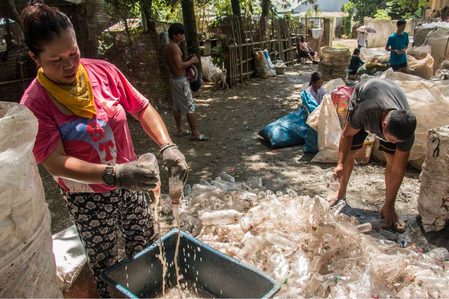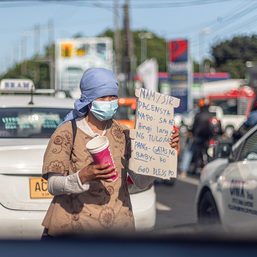SUMMARY
This is AI generated summarization, which may have errors. For context, always refer to the full article.

MANILA, Philippines – Waste workers and environmental groups launched the Magna Carta for Waste Workers on Tuesday, June 11, in a bid to push for the legislation of rights, protection, and the formalization of the sector.
Aloja Santos, president of the newly formed Philippine National Waste Workers Association (PNWWA), represented the sector during the launch.
Organizations that supported the Magna Carta include the Mother Earth Foundation, Global Alliance for Incinerator Alternatives (GAIA) Asia Pacific, Philippine Earth Justice Center, and EcoWaste Coalition.
Santos shared the unfair conditions that waste workers like her had to endure for being invisible from the law: no safety equipment, no health benefits, and no minimum wage. They are overworked, underpaid, and often exposed to all kinds of weather conditions and health hazards.
“Kami po ay nagsama-sama para isulong ang pantay na karapatan para sa aming lahat na waste workers (We came together to push for equal rights for waste workers),” Santos said during the briefing.
Waste workers include garbage collectors, waste pickers, segregators, and recyclers – people working in waste collection up to disposal.
Those working with the government or the private sector are included in the formal sector. Meanwhile, those who work in their individual capacity as waste pickers or scavengers are part of the informal sector.
According to a recent estimate from GAIA, there are over 100,000 waste workers in the Philippines’ informal sector. The group said this is “a gross underestimation” as many workers are left uncounted.
In the Magna Carta, workers demanded for the following:
- enforcement of labor standards
- hazard pay
- health insurance and services
- humane and safe working conditions
- job security
- just compensation
- meaningful participation in policy spaces
- right to organize
- social benefits and protection
- training
Last April 17, Senator Loren Legarda filed the document as Senate Bill No. 2636. It is now pending at the committee level.
While they are hopeful that Congress will approve the law immediately, Santos said they also want to see local governments start treating their waste workers better.
“Bigyan ‘nyo kami ng halaga dahil kami po ay mahalaga,” said Santos. (Give us importance because we are important.)
Formalization of the sector
The demands may seem rudimentary for humane labor conditions. But this just goes to show how invisible waste workers have been in the eyes of the law.
“Dapat nga siya hindi na hinihingi (We shouldn’t be asking for these in the first place),” Froilan Grate, the Asia Pacific coordinator of GAIA, said on Tuesday.
Grate said the goal eventually is to help transition the workers into a formal system. Thus the demand for the enforcement of labor standards, as provided in the Labor Code, on waste workers.
For example, the Magna Carta states that waste workers are to be paid at least the minimum wage for non-agricultural workers.
“Kasi ang kanilang paniniwala ay we may be informal right now, but we are workers, we deserve the same protection under the law,” said Grate.
(They believe that they may be informal now but they are workers who deserve the same protection under the law.)
According to the Magna Carta, those in the informal sector “shall have the right to form or join an association,” and that these would be registered with the Department of Labor and Employment (DOLE).
DOLE is likewise expected to coordinate with other agencies to ensure informal workers’ access to medical assistance, transportation, food, and other necessary forms of support.
In line with the climate agenda
Pushing for waste workers’ rights is not only a labor issue but also one that concerns the country’s climate agenda.
Romell Cuenca, assistant secretary at the Climate Change Commission, said the agency supports the document advocating for workers’ rights.
“Hindi naman po mabigat ang utos [na] ito kasi ako, naniniwala ako sa adhikain na ‘to (This is not a burdensome demand as I myself believe in this advocacy),” Cuenca said.
Cuenca said the Magna Carta is aligned with the country’s National Adaptation Plan, the Ecological Solid Waste Act, and the 2015 Paris Agreement. (READ: Philippines submits climate adaptation plan to UN body)
Waste workers are frontliners in the world’s fight against its massive waste management problem. Recycling and composting are some of the ways that, if implemented at scale, could divert organic waste from landfills that emit methane emissions into the atmosphere. – Rappler.com
Add a comment
How does this make you feel?









![[OPINION] Grading Marcos admin’s performance on the climate agenda](https://www.rappler.com/tachyon/2024/06/grading-marcos-performance-climate-agenda-june-25-2025.jpg?resize=257%2C257&crop=441px%2C0px%2C1080px%2C1080px)





![[OPINION] Unpaid care work by women is a public concern](https://www.rappler.com/tachyon/2024/07/20240725-unpaid-care-work-public-concern.jpg?resize=257%2C257&crop_strategy=attention)




There are no comments yet. Add your comment to start the conversation.